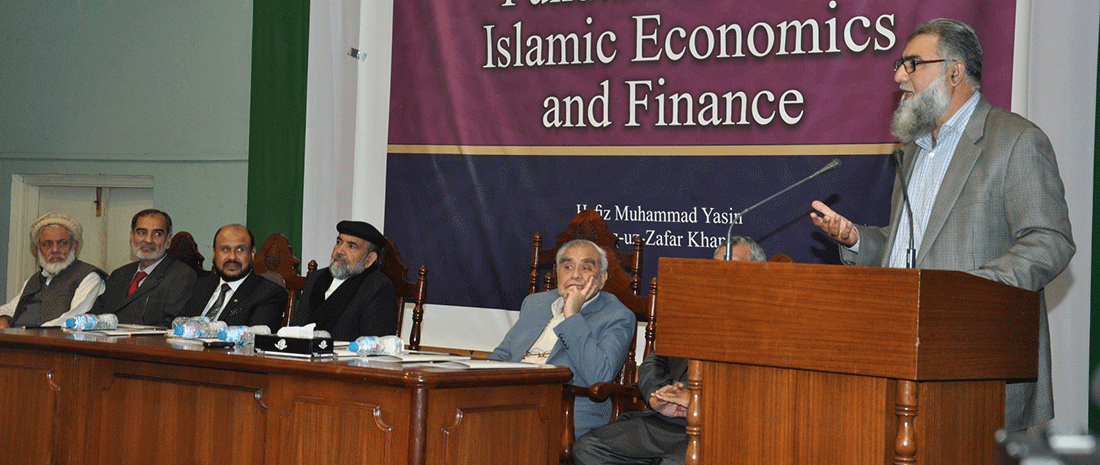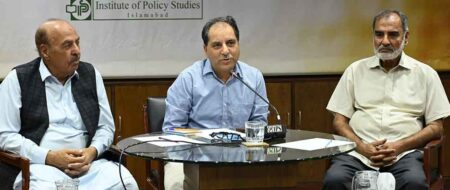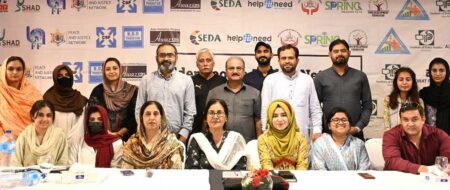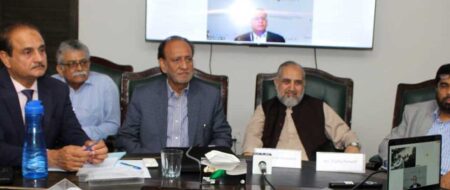Book Launch of ‘Fundamentals of Islamic Economics and Finance’
Policymakers urged to make use of Islamic economics framework to foster development in Pakistan
Terming Islamic economics and finance framework a stepping stone towards the realization of Madina model of state, Professor Dr Qibla Ayaz, chairman, Islamic Ideology Council, urged policymakers in Pakistan to exploit huge potential offered by the discipline to foster economic development in the country.
He was speaking at the launching ceremony of IPS Press’ publication Fundamentals of Islamic Economics and Finance, which was held at the International Islamic University, Islamabad (IIUI) on February 13, 2019. Alongside Dr Ayaz, the ceremony was addressed as chief guests by Prof Dr Anis Ahmad, vice chancellor, Riphah International University (RIU), and Prof Dr Ahmed Yousif Al Draiweesh, president, International Islamic University, Islamabad. The session was chaired by Prof Dr Masoom Yasinzai, rector, International Islamic University, Islamabad, co-chaired by Khalid Rahman, director general, Institute of Policy Studies (IPS), Islamabad, and addressed by Prof Dr Muhammad Tahir Mansoori, member, Shariah Academy Board, SECP and Prof Dr Muhammad Fahim Khan, former chairman, Islamic Economics Department, Islamic Research and Training Institute (IRTI), Jeddah. The authors of the book Dr Atiq uz Zafar Khan, director general, International Institute of Islamic Economics and Hafiz Muhammad Yasin, professor, Preston University, Islamabad were also present on the occasion.
Dr Ayaz was of the opinion that the presently evolving free market economic model was merely a new shape of capitalism and its study was only producing workers to serve the model. The framework offered by Islamic economics on the other hand offered much better prospects to cater for the issues that were left unaddressed by the prevailing paradigm.
Professor Draiweesh, in his speech, lauded the effort made by the authors of the book while highlighting the significance of publishing such insightful material in contemporary times. The speaker also stressed that such books should be taught in modern universities and colleges as a robust economic model, offering alongside the Institute’s umbrella to support the research work in the said discipline.
Prof Dr Yasinzai talked about the need of establishing a Centre of Excellence for Islamic economics, stating that the subject had all the potential to offer solutions for contemporary economic problems. He said that such initiatives had already been taken by some foreign institutions but have sadly been ignored in the Pakistan thus far.
The speaker praised excellent work done by the authors and IPS Press in publishing the research work in form of a book. He said that the content of the book was not only an invaluable resource for students and academicians, but also had perceptive material to attract the on-field professionals and practitioners, as well as to apprise the people who want to know the basis of this subject.
It is pertinent to mention here that the book was originally published by Islamic Research and Training Institute (IRTI) – a member of the Islamic Development Bank Group – in Jeddah, Kingdom of Saudi Arabia in 2016, and the low-priced edition of this pioneering work has now been published by IPS Press – the publishing arm of Institute of Policy Studies, Islamabad – under a reprint arrangement exclusively for sale in South Asia and South East Asia territory.
The book is aimed at presenting the important fragments of the diverse emerging discipline of Islamic Economics and Finance in one volume, explaining its different concepts in simple words on which there is a consensus among scholars, bypassing the differences of opinion at this level. A comparative approach to the mainstream economics has been followed throughout for better understanding of the concepts.












